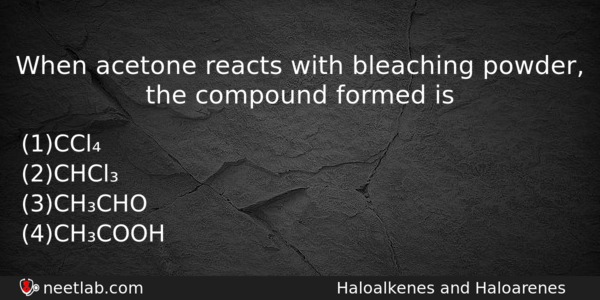| ⇦ | 
| ⇨ |
When acetone reacts with bleaching powder, the compound formed is
Options
(a) CCl₄
(b) CHCl₃
(c) CH₃CHO
(d) CH₃COOH
Correct Answer:
CHCl₃
Explanation:
It involves two steps: CaOCl₂(Bleaching powder) + H₂O → Ca(OH)₂ + Cl₂ . (i)Chlorination of acetone to form trichloroacetone. CH₃COCH₃ + 3Cl₂ → CCl₃COCH₃ + 3HCl. (ii) Trichloroacetone is hydrolysed by Ca(OH)₂ present in bleaching powder to give chloroform. 2CCl₃COCH₃ + Ca(OH)₂ → 2CHCl₃(Chloroform) + (CH₃COO)₂Ca(Calcium acetate).
Related Questions: - If electron has spin quantum number +1/2 and magnetic quantum number –1,it cannot
- Choose the incorrect statement in respect of physisorption
- Which of the following is a representation of Gay-Lussac’s law
- An ion has 18 electrons in the outermost shell, it is
- The minimum amount of energy required for the reacting molecules to undergo
Topics: Haloalkenes and Haloarenes
(78)
Subject: Chemistry
(2512)
Important MCQs Based on Medical Entrance Examinations To Improve Your NEET Score
- If electron has spin quantum number +1/2 and magnetic quantum number –1,it cannot
- Choose the incorrect statement in respect of physisorption
- Which of the following is a representation of Gay-Lussac’s law
- An ion has 18 electrons in the outermost shell, it is
- The minimum amount of energy required for the reacting molecules to undergo
Topics: Haloalkenes and Haloarenes (78)
Subject: Chemistry (2512)
Important MCQs Based on Medical Entrance Examinations To Improve Your NEET Score
18000+ students are using NEETLab to improve their score. What about you?
Solve Previous Year MCQs, Mock Tests, Topicwise Practice Tests, Identify Weak Topics, Formula Flash cards and much more is available in NEETLab Android App to improve your NEET score.
Share this page with your friends

Leave a Reply